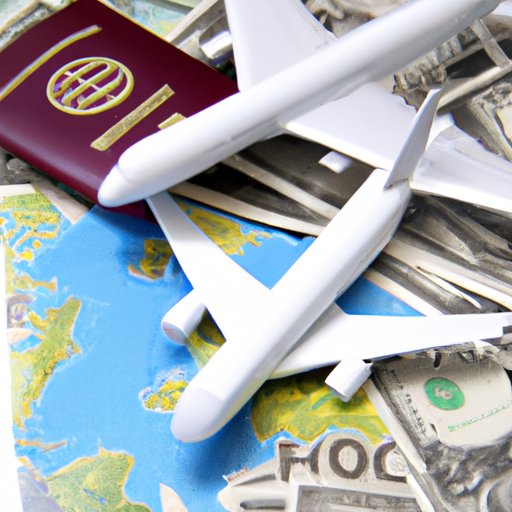Introduction
A vacation is a period of time away from work or school for rest, relaxation, and enjoyment. Vacations can be spent with family, friends, or alone, and can include trips to far-off locations or just a staycation at home. But one thing is certain: vacations can be expensive. In this article, we’ll explore why vacations can be so costly and provide tips to help you save money on your next trip.
The Cost of Airfare
Airfare is often one of the most expensive components of a vacation. The cost of flights can vary greatly depending on the airline, destination, season, and more. Airlines typically charge more for flights during peak travel periods, such as summer and holidays, while they may offer discounted fares during slower times of the year. Airlines also tend to charge more for last-minute bookings and for long-haul flights.
To get the best deals on airfare, it’s important to plan ahead and be flexible with your travel dates. Booking flights well in advance can help you take advantage of early bird discounts, and being open to different departure and arrival times can help you find cheaper flights. Additionally, using budget airlines or flying out of smaller airports can help you save money.
Rising Accommodation Prices
Accommodation costs can make up a large portion of a vacation budget. Hotels, resorts, and other lodging options often increase their prices during peak seasons and special occasions, such as holidays and festivals. Additionally, the location of the hotel can affect its price; hotels in popular tourist destinations tend to be more expensive than those in less visited areas.
To save money on accommodation, it’s important to research lodging options before booking. Look for hotels that offer discounts or packages and consider staying in an Airbnb or hostel instead of a traditional hotel. Additionally, consider traveling during the off-season when prices are lower and fewer people are traveling.

Increased Demand for Vacation Destinations
With the rise of social media, more and more people are traveling to popular vacation spots, which can lead to increased demand and higher prices. Tourist destinations that were once relatively unknown have become hotspots, resulting in overcrowding and inflated costs. This has led to an increase in prices for everything from flights and accommodations to activities and tours.
If you’re looking to avoid crowded destinations, try researching lesser-known places or planning a trip during the off-season. Additionally, consider exploring local attractions rather than paying for pricey tours and activities. You can also look for discounts and deals on websites like Groupon or LivingSocial.
Increased Cost of Activities and Tours
Activities and tours can add up quickly, especially in popular tourist destinations. Many of these attractions come with hefty entrance fees and additional costs for transportation and food. Additionally, some activities require reservations, which can be difficult to secure during peak times.
To save money on activities and tours, research attractions before you go and look for discounts or package deals. Additionally, consider exploring free attractions or doing self-guided tours rather than paying for expensive guided tours. And if you’re visiting a popular destination, try to plan ahead and make reservations as soon as possible.
Hidden Fees and Extras
When planning a vacation, it’s important to factor in hidden fees and extras that can add up quickly. From baggage fees and airport taxes to resort fees and city taxes, these unexpected costs can significantly increase the overall cost of your trip.
To avoid hidden fees, research all the costs associated with your trip before booking. Additionally, look for package deals and look into alternate transportation options, such as taking the bus or train instead of renting a car. Finally, contact the hotel directly to inquire about any extra charges.
Currency Exchange Rates
Currency exchange rates can also affect the cost of a vacation. When traveling abroad, it’s important to consider the exchange rate between the country you’re visiting and your home country. If the exchange rate is unfavorable, it can mean spending more money on your trip.
To save money on currency exchange, research the current exchange rate before you go. Additionally, consider using a credit card that doesn’t charge foreign transaction fees, and look into prepaid debit cards or traveler’s checks to minimize costs. Finally, try to use cash as much as possible while abroad and avoid exchanging money at the airport.
Inflation and Rising Prices
Inflation is another factor that can affect the cost of a vacation. As prices rise due to inflation, the cost of goods and services increases, making vacations more expensive. Additionally, inflation can also lead to higher airfare prices as airlines adjust their fares to keep up with the rising cost of fuel.
To save money despite inflation, look for discounts and deals. Additionally, consider using loyalty programs or rewards points to offset the cost of your trip. And finally, be mindful of your budget and try to stick to it as best you can.
Conclusion
Vacations can be expensive, but there are ways to save money. By understanding the factors that influence vacation costs and following the tips outlined in this article, you can find cheaper airfare, accommodations, activities, and more.
(Note: Is this article not meeting your expectations? Do you have knowledge or insights to share? Unlock new opportunities and expand your reach by joining our authors team. Click Registration to join us and share your expertise with our readers.)
